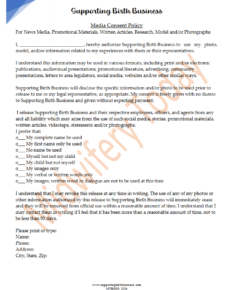
Amanda Greavette—amandagreavette.com
The Newborn Imprint
Editor’s note: This article first appeared in Midwifery Today, Issue 104, Winter 2012.
Subscribe to Midwifery Today Magazine
We are born once onto this living planet of rocking oceans streaming with sea life, wide skies with winged beings, uneven terrains covered with flowering plants and creatures of unending diversity, spinning in a vast universe where we wonder if there are other life forms similar to our own. We are born once into a family species that is the most complex, developed and sentient of all the life forms on this cosmically floating paradise. We are born but once.
Our delicate eyes have been accustomed to dappled and muted light. Our delicate ears have been protected by layers of sound-absorbing organic blankets. Our delicate skin has been introduced to touch and caressed by the soft waves of moving water where even the touch of gravity does not enter. Our taste is for sweet, salty water. Our nose drinks as freely as our mouth, and the smell we know as home is shared by our entire global family.
It is not a mystery or unusual that most babies of all the mammalian species are born at night in a quiet nest far from the edges of light and sound and thundering movement. It is not a mystery or unusual that a birthing mother will turn day into night by going deeper in the woods or a den or a cave to make a nest of peace for herself and her baby. The Earth has been teaching life how best to survive for millions and millions of years. The instinct is so strong that even domesticated pets or farm or zoo animals will work and work to recreate what they would easily find in their natural environment, searching for places apart, away, hidden, lower, under, difficult to reach, difficult to discover, difficult to find…a secret place of peace where the senses are all softened and the great work of being born can unfold with the greatest of ease. It is not a mystery. It is life. Instinctual life; wise and wonderful life.
Every baby born deserves uninterrupted, undisturbed contact with her mother in the environment the mother has nested by her own instinctual nature to create. Any movement we make to enter that inner and external womb must be acknowledged as disturbing and violating to what nature is protecting.
If you have had the privilege to see a baby born in complete silence with only the light of the moon or dappled sun rays, far from the womb-like nest as only an instinctual mother can make; if you have seen the wide eyes of the newborn undisturbed as she emerges onto this shared planet for the first time; if you have heard the sounds of silence as the baby’s breath begins to move in and out, haltingly at first as the mother touches more with her eyes than any other part of her body; if you have watched this silent, quiet symphony of coming into being, transporting from an inner water world to the outer air world of growing sight and sound and smell and touch and taste, then you know how very slow and long and steady the process is if it is not to be cruel, abrasive, abusive, inhumane and all together unholy. Regarding the nervous system and its interrelatedness to stress, fight, flight, immune reserves, adrenal reserves and all things measurable and immeasurable, we can rightly project that the long-term mental, emotional and physical health of a baby is directly affected by the newborn imprint.
If you have had the misfortune, as nearly all of us who can read and write have had, to see a baby born, perhaps pulled out, under bright lights with glaring eyes and loud noises of all sorts, in a setting that smells like nothing human, with a mother shocked and teary and scared; if you have witnessed or performed touch that can only be described as brutal and cruel in any other setting, then you know how very, very quickly the baby clenches his fists, eyes tightly closed, mouth screaming in pain, every limb fighting for freedom until complete exhaustion wins to bring peace to a nervous system, an adrenal system and a body-mind-soul connection that was prepared for nothing of the sort.
Our native chiefs often say, “We don’t have time to grow new leaders.” That is how I feel when I hear folks talk about research or studies to determine how we might change or improve our approach to birth and the first few moments of life for the newborn. The research and study is millions of years old and nature puts the instinctual knowledge into every birthing mother. Every baby born deserves uninterrupted, undisturbed contact with her mother in the environment the mother has nested by her own instinctual nature to create. Any movement we make to enter that inner and external womb must be acknowledged as disturbing and violating to what nature is protecting. We do not know the long-term effects of such disturbance. We cannot consider too seriously a decision to disturb a newborn by touch, sound, light, smell and taste that is different and beyond what the mother is naturally and instinctually providing. Even facilitating is often unnecessary if the motherbaby are given space and time to explore and relate to one another and the life-altering experience they just survived. They both have been turned inside out, one from the other, and the moment to face that seemingly impossible feat cannot be rushed without compromise. We have no right to compromise either a mother or a baby.
I am deliberately leaving out the issue of life-saving because it has become the license for full-scale abuse to every baby born. Not every baby will live, clearly, and not every baby will die if they are born alive and we remain at a distance to witness the process of newborn imprinting that has insured the survival of our species and all others like it since the dawn of life awakened on our planet.
The newborn imprint begins in the womb. The baby is rocked by how her mother uniquely walks on the planet. The sounds baby hears are the ones of his own mother’s voice and the people around her and the songs, shouts, music, noise, animal sounds, storms or sirens. Whatever environment surrounds the mother also surrounds the baby. Baby’s language is already being programmed with echoes from the mother’s voice. Food and sleep come at rhythms that begin to take on a picture of the world outside reflected to the baby inside. Dreams and wishes and fears are all shared by the motherbaby who are one and cannot be separated if they are to survive and carry forward another generation.
So accustomed is the newborn to his mother’s language that in later pregnancy I have a habit of talking to the baby in another language. Just for fun I sing or talk in this new way which inevitably evokes extra movement and will reassure a wondering or worried mother or bring a peal of laughter to us all to see how very, very interactive baby is with new stimuli. The unborn and newborn are eager to interact with life that is not overwhelming. They, like we all, are curious to learn and explore, opening their eyes and hands and mouth to reach for what is pleasant and shutting down and out in reaction to what is unpleasant. For the newborn, that is everything foreign and rushed.
Stimulation
Stimulating the baby’s inner ear (or anus) with the tongue is an instinctual response by birthing mammals. Many observations have been made of seemingly unresponsive babies who, following a good full body kiss by the mother, moves, breathes and comes into being. It is my first response and preferred resuscitation skill for a slow-to-start baby. If mothers have lost their instincts, they can be taught.
When we make midwife a verb, as indeed it is in all its reality to native peoples, then we see what power there is for every person who touches the life of birth. Whatever title you have, if you are in the room or space when a newborn arrives, you are responsible for the imprint you leave on the baby’s body, mind, soul and being—an imprint that may affect how they experience health, relationship, longevity, emotional stability, mental agility, spiritual oneness and aspects to their understanding of life that can never be measured.
You are midwifing the newborn into this world. You are imprinting the newborn with your presence, your voice, your touch, your fear, your joy, your focused love or scattered indifference. Slow down. Slow everything down. Hold the silence. Back up, open your eyes and listen. Feel your skin. Smell the air. Behold the mother. Time has stopped for her and time has begun for the newborn. Together they will balance each other. Together, undisturbed, they will imprint each other in a moment that will last them a lifetime. No one else will do; no one else should do.
Notice how you midwife. It doesn’t matter if you are the doula, partner, relative, doctor, midwife or the one making the soup; if you are in the space of birth, you are midwifing. There is so much you can do to make sure you do nothing to disturb the natural newborn imprint. Breathe long and slow and deep. That is the greatest contribution you can make to the moment. Keep your eyes open and witness the unfolding that happens only once in the lifetime of every baby born, yet sets in motion the neurological pathways of truth upon which the baby will build her reality. See what you see. Hear what you hear. Smell what you smell. Your knowing will have increased. Tell your story because the world needs these stories. Like zoo animals, many human babies are now born in captivity. Because of the captivity in hospitals, our mothers struggle to cope with their extinguishing instincts as the newborn struggles to identify the mother. Non-captivity in birth can be reclaimed. Start by noticing what part you play in newborn imprinting.
When it is time, and long after the mother has done so, cover the baby with kisses. It is the natural mammalian response and can save lives and set the course for feeling loved.

 Sister MorningStar has dedicated a lifetime to the preservation of instinctual birth. She birthed her own daughters at home and has helped thousands of other women find empowerment through instinctual birth. She is the founder of a spiritual retreat center and author of books related to instinctual and spiritual living. She lives as a Cherokee hermitess and Catholic mystic in the Ozark Mountains of Missouri. Visit her on the web at:
Sister MorningStar has dedicated a lifetime to the preservation of instinctual birth. She birthed her own daughters at home and has helped thousands of other women find empowerment through instinctual birth. She is the founder of a spiritual retreat center and author of books related to instinctual and spiritual living. She lives as a Cherokee hermitess and Catholic mystic in the Ozark Mountains of Missouri. Visit her on the web at: 



















